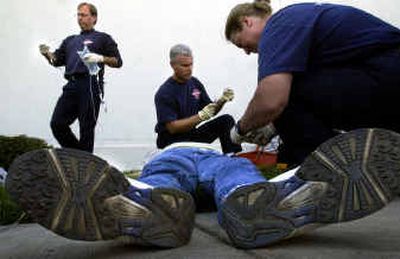City hopes voters say yes to EMS

Spokane Fire Department paramedic Bill Gonzalez has assisted in three births in his 14 years on the force.
Those were the good news calls.
Much more often, he’s rushed to the aid of sick, hurt and dying people in his job at Station 13 at Wellesley and Jefferson on the North Side.
“We’ll take care of anybody or anything,” Gonzalez said Tuesday. “If they call 911, we go.”
Last year, Gonzalez and his firefighting co-workers responded to 18,400 emergency medical calls, up from the 3,900 calls logged in 1980 during the early years of Spokane’s emergency medical response system. Today, EMS calls outnumber fire calls by more than 4-to-1.
Voters on Sept. 14 are being asked to reapprove a six-year property tax levy that helps pay for Spokane’s emergency medical response system. The cost is 50 cents per $1,000 of assessed valuation, or $50 on a $100,000 home in the first year of the levy. The cost declines slightly in each of the following five years because of state tax limits.
The current levy expires at the end of this year. It needs a 60 percent yes vote to pass.
Over the years, the department has relied on EMS levy funding to maintain services. In 2005, it would bring an estimated $4.6 million to the department’s $26.5 million annual operating budget.
Voters said yes to the first EMS levy in 1980 by a fairly close 62 percent approval. The popular program was reauthorized in 1986, 1992 and 1998 with yes votes ranging from 75 percent to 82 percent. Two public opinion surveys over the past seven years have both ranked EMS as the city’s second-most important service. Fire protection in the surveys was rated as the most important service with police services a close third.
Even so, fire officials are not assuming voters will automatically say yes again, although they are hoping the department’s track record and the importance of EMS to public safety will be enough to gain another win.
“It’s not a new measure before the community,” Fire Chief Bobby Williams recently told the City Council. “We are not anticipating any major changes in service” in the next six years, he said.
Williams said loss of the levy would limit the department’s basic and advanced life support responses. The EMS levy pays for the department’s 45 firefighter paramedics and other staff, plus costs associated with the city’s response to emergency calls.
Rich Kness, medical service officer for the department, said the levy “is essential for the community for the EMS system we have today.” He said Spokane compares favorably to major cities with the best emergency response systems in the country. For example, Spokane’s response times and number of trained paramedics are similar to the top cities studied by USA Today, he said.
Without the levy, the department would likely be forced to reduce staffing, resulting in fewer vehicles and crews and longer response times, Kness said. Training could be reduced. The mayor and City Council would ultimately decide on any cuts, he said.
Paramedics such as Gonzalez are trained in advanced life support techniques, and have completed a health sciences certificate program. Gonzalez took the classes at Spokane Community College. The training involves handling of all life-threatening emergencies, including heart attacks and cases requiring emergency medication.
All other firefighters are cross-trained as emergency medical technicians for basic life support, which includes control of bleeding, cardiopulmonary resuscitation, fracture care, airway opening and heart defibrillation.
When an emergency medical call is received, dispatchers determine the seriousness of the emergency and send the nearest available fire engine as the first responder. That crew will arrive on the scene in an average of five to six minutes. A paramedic crew is dispatched for advanced life support if needed.
American Medical Response of Washington provides ambulance transport under a sole-provider contract with the city. The contract includes performance standards requiring the company to use newer vehicles and trained personnel among other requirements.
Ambulance costs in Spokane are below those paid by residents in other cities, said Kness, medical service officer. The average charge for an ambulance ride is about $450, he said.
For voters who don’t want to cast a partisan ballot in the primary, they can request a nonpartisan ballot that includes the EMS levy.
Mike Fagan, who has been active in statewide anti-tax initiatives, said that when it comes to public safety, voters are inclined to support taxes. “I have no problem (with the EMS tax) if the voters are voting for it,” he said.
Dianne Wiebe, of the North Hill Neighborhood Council, said when it comes to paramedics, “We do need them.”